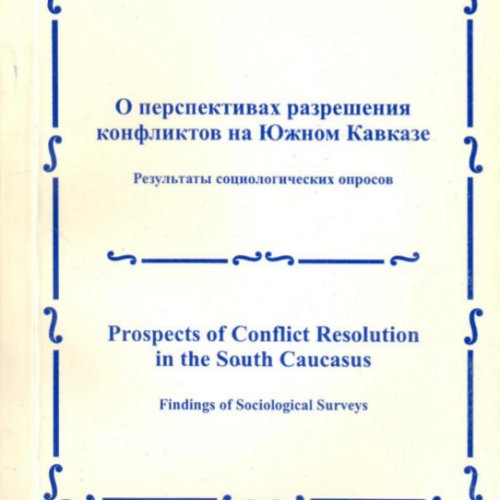Prospects of Conflict Resolution in the South Caucasus
Findings of Sociological Surveys 2001
Tbilisi, 2002
The Caucasus is a region of tradition, which nowadays makes front page news not only by its protracted so-called “frozen” conflicts and frightening instability but no less so by the prospects of transnational and regional projects, such as Baku-Tbilisi-Jeyhan oil and gas pipelines or TRACECA. The Caucasus region is divided into the Northern Caucasus populated by peoples representing the republics and ‘oblasts’ in Russian Federation’s southern part, and South Caucasus.
South Caucasus is a relatively new term in geography, including political geography that has replaced the old Russo-centric concept of Zakavkazye or Trans-Caucasus inherited from the times when the entire region was part of the USSR, and earlier the Russian Empire. Regaining their national statehood, the three South-Caucasus countries – Armenia, Azerbaijan and Georgia – strive to overcome the legacy of totalitarian Soviet system, peacefully “defreeze” the conflicts and build modern democratic communities.
The idea of the project “South Caucasus Network for Civil Accord” was conceived a few years ago, and started to implement since summer of 2001 jointly by nine partner non-governmental organisations in the three South-Caucasus countries with support from the Tacis Democracy Programme of the European Commission, Friedrich Ebert and Friedrich Naumann Foundations. The European partner and the grant administrator is the British East-West Centre.
The project has been scheduled for two calendar years, includes a number of activities, such as thematic meetings and conferences, web pages and online bulletins, TV films and talk shows, sociological surveys, opinion polls and content analysis of the media. All the project works are clustered into three Modules. The present publication has been made with support from the Friedrich Ebert Foundation and represents the findings of the Phase One works done in Module 2. Although this is part of the general project scheme, the results have also independent value, in so far as they will not be thematically repeated at any other stage of the project. If the present survey emphasizes the unsolved conflicts topic, the next Phase publication will focus on the human rights situation in subregion of the South Caucasus. As a generalised result of the Module 2 works, it should become possible to measure a Mutual Perception Index of Armenians, Azerbaijanis, and Georgians.



